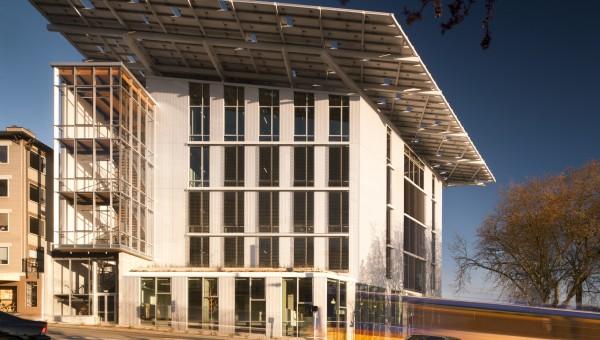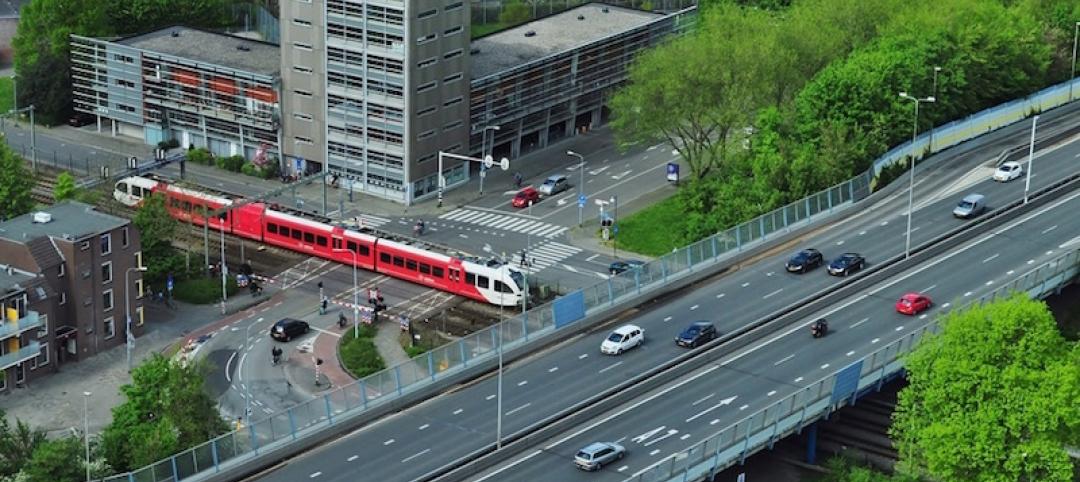The Bullitt Center in Seattle, which some say is the world's "most efficient" office building is not only influencing how other structures are built, it is contributing to revisions of codes and public policy.
The building’s design was made possible by Seattle’s Deep Green Pilot Program that allows builders to deviate from standard codes to build more sustainably. For example, the building was allowed to add two to three feet to the height of each floor to allow more daylighting. Neighbors objected to the additional 10 feet in overall building height, but the program permitted the non-conforming design.
Some of the building’s code deviations have been incorporated into the city code. For instance, the city council and the mayor had to approve changes to the building code to allow permits for “sustainability features.” This move allows the building’s solar canopy to extend all the way to the property line.
Bullitt Foundation, the environmental group that owns the building, recently signed a first-in-the-nation agreement with the local utility that will allow the foundation to sell Seattle City Light the energy it is saving or “negawatts.” The arrangement, known as MEETS (metered energy efficiency transaction structure) could be a pioneer in drawing investment funds to energy-efficiency projects.
Bullitt is also seeking final approvals from the county and state to turn the building into its own water district. That designation would allow tenants to drink rainwater collected on site and treated in the building’s basement.
(http://grist.org/business-technology/how-one-building-is-changing-the-world/)
Related Stories
Codes and Standards | Oct 6, 2016
Obama administration will spend $80 million for smart cities initiatives
The technology is targeted for climate, transportation, resiliency.
Codes and Standards | Oct 6, 2016
New York City files criminal charges on owner for deadly building façade accident
The owner allegedly did not heed warning about danger of the crumbling exterior.
Codes and Standards | Oct 5, 2016
New York becomes the first city to adopt a target for energy storage
Mayor de Blasio also announces increased solar generation goals
Codes and Standards | Oct 4, 2016
New global residential floor space measurement standard unveiled
The new standards will produce better transparency and are said to benefit investors.
Codes and Standards | Sep 29, 2016
Dept. of Energy forecasts big jump in LED use, resulting energy savings
Big gains are expected in both commercial and residential markets.
Codes and Standards | Sep 28, 2016
San Francisco commercial, multifamily regulations aim to reduce traffic volume
City planners will require design features to cut miles driven.
Codes and Standards | Sep 28, 2016
Society of Landscape Architects releases guide to resilient design
The goal is to retrofit communities to better withstand extreme weather events.
Codes and Standards | Sep 26, 2016
Washington State Energy Code updates include dedicated outdoor air system requirements
The updates will change design approach to HVAC.
Codes and Standards | Sep 22, 2016
Construction firms pulling back from federal market due to new reporting rules
‘Subjective, very vague’ policies are said to create too much risk.
Codes and Standards | Sep 21, 2016
Airbnb presents legal liability for multifamily owners
How building owners can reduce risks.
















